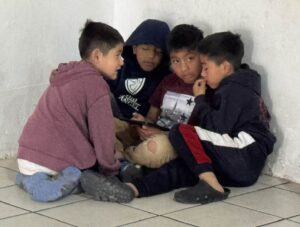 Mark’s gospel says that when Jesus came up out of the waters of the Jordan River, the heavens were torn apart. When we say the skies crack open, we usually mean that someone got drenched. At Jesus’s baptism, perhaps a filigree of lightning formed the graceful shape of a dove and thunder evoked the voice of God.
Mark’s gospel says that when Jesus came up out of the waters of the Jordan River, the heavens were torn apart. When we say the skies crack open, we usually mean that someone got drenched. At Jesus’s baptism, perhaps a filigree of lightning formed the graceful shape of a dove and thunder evoked the voice of God.
In Ezekiel, as we heard, the prophet said that the Lord will sprinkle clean water and cleanse the nations. They had worshiped false gods, behaved indolently and selfishly, and had oppressed the foreigner and the stranger. But the waters of heaven would reconcile them to God once again
A few verses after our passage from Paul’s second letter to the Corinthians, the apostle invites us to cleanse ourselves from every defilement of body and spirit — language which again invokes the powerful image of purifying water. This cleansing is the means by which we become ambassadors of reconciliation, and the new creation is revealed. All of this, of course, is redolent of our baptism.
So Jesus burst from the waters and began his trail of tears to the cross. We read in Revelation that around the throne of the Lamb, every tear was wiped from every face. That’s a lot of damp faces, a lot of saved up tears. After this week down by the Riverside – in these days of epic official inhumanity – from now on, I will read this passage from Mark and imagine the sky cracking open and drenching Jesus and his friends with all of heaven’s accumulated tears, anointing them for the hard work ahead.
Even the psalmist says, “My tears have been my food day and night, while all day long they say to me, where now is your God?” Few of us experience such unrelenting discouragement. To get through our days, we have to maintain perspective and conserve precious resource.
Which is why tear-inducing exercises such this week’s are so important for our vocational discernment. Our facilitator, the Rev. Canon Whitney Rice, said yesterday morning that Jesus’s questions don’t shy from intensity. That’s for sure!
When the women came to the tomb, and our risen Lord asked why they were weeping, we now have permission to imagine that the question was not just about Jesus’s resurrected condition, which was a cause for joy, but our human condition, which is a veil of sorrow. “Why are you weeping?” was perhaps never a rhetorical question, neither to the women nor us. “Why are you weeping?” is an invitation to vulnerability, self-awareness, and acknowledgement of our existential fears. Mary Tororeiy said it best yesterday. Beholding her fellow people of God, beholding the world, beholding our historical setting, she asked, “How could I not weep?”
Hearing Jesus’s question as posed by Canon Rice and rephrased by Mary, I’ll say some of what I wrote about the wellspring of my tears. I wrote that I miss my dad every day, even though I barely knew him and rarely saw him. I wrote that I could make myself weep remembering that when I was a distracted boy – young, but old enough to know better – I didn’t ask my English grandparents any questions about their lives. I weep thinking that Kathy will die and leave me behind. I weep thinking that I’ll die and leave Kathy behind. I weep realizing that I’m probably just a little too old to make it our youngest grandchild Silas’s high school graduation.
I weep for friends grappling with the relentless disturbances of being human – their chronic illness or pain – their lonely struggles to find their footing in the world — friends and colleagues still out of their homes because of the wildfires.
Weeping for ourselves and those close to us comes naturally. It takes time and energy to focus on all the suffering beyond our horizons — such as those who may get sick or die because our government has suspended or canceled vital foreign aid programs. If they follow through on their threats to suspend or terminate the PEPFAR anti-HIV-AIDS program in Africa, hundreds of thousands or more would die.
But the foreign aid budget doesn’t have a large domestic constituency. So it was one of the first things this government cut. It was a litmus test for our national tear ducts.
I’ve just been to the border with our Sacred Resistance colleagues, so I can actually visualize those faces — people being tortured by presidents in Washington and San Salvador – children with nowhere to lay their heads or go to school but for the kindness of a few devoted Mexican and U.S. nonprofit workers. People living in conditions most Americans wouldn’t permit for a single day if it were a member of their families. But these days, no politician, Democratic or Republican, can win votes standing up for the human dignity of Haitians or central Americans stranded along the border, our siblings frozen in history between cruel capitals.
It’s an experiment to see how much inhumanity a nation will tolerate. To see if selfishness is the new kindness.
Everyone in this congregation is doing all they can for the glory of God and the sake of God’s people. The intimidating vastness of all that must be done eventually cannot be allowed to prevent us from doing all that is possible today. We heard yesterday that according to one wise authority, it is sufficient for Christians to give one drop of blood at a time.
I think about this every time I’m deciding whether to allocate five dollars to someone who begs from me on the street or at a freeway off-ramp. Our focus this week is Jesus’s questions, not his commandments. But Jesus says in Luke’s gospel, “Give to everyone who begs from you. This sounds unconditional.
But even anti-gay Bible literalists, hearing this commandment, become graduate-level historical and cultural bible critics. I’ve had long arguments in receiving lines after church with those who tell me what Jesus really meant when he said to give to everyone who begs from us. They’ll say, “if I give that guy five dollars, he’s just going to spend it on liquor. Jesus doesn’t want that for him! So I’m actually doing him a favor – and besides, I need to keep the five dollars so I can spend it on liquor.”
Every person in need we encounter encloses a universe of narrative. We want to ask what happened. We wonder where they’ll sleep that night. If they have children with them, we want to fold them in our arms. But curiosity will lead to relationship, and relationship to empathy and love, and love to commitment and responsibility. So we short-circuit the process by smothering our curiosity.
But our politics today – this is no longer a matter of maintaining perspective or conserving precious resource. This movement wants to change our imperfect but promising republic into something unrecognizably unkind. We’ve heard their house pastors preach against what they call the sin of empathy. Pope Leo himself, before his election, repudiated the vice president’s assertion that we are to love our family first and our neighbor last. Our government is test-marketing a canon of cruelty diametrically opposed to the gospel and yet anointed by purportedly Christians leaders.
Legal U.S. residents, deported illegally and packed like animals in cages in El Salvador.
Millions of immigrant workers threatened with mass deportation.
Our trans and non-binary siblings, their personhood erased by executive order.
Heroic narratives of people of African descent, erased from government websites.
Gaza on the verge of mass starvation after our president told Israel, “Do what you have to do.”
These are all litmus tests for a nation’s clogged tear ducts.
But even politicians of good will aren’t getting any traction standing up for kindness. Kindness did not win the popular vote or the Electoral College.
It’s unpopular. It’s unfashionable. Yes, this sounds like a job for The Episcopal Church. And indeed for all people of true faith in our country today – Jews, Christians, Muslims, anyone following a doctrine or creed that centers the dignity of every human being, as all great faiths do. What if we find new friends in faith, forge new partnerships, build new bridges, identify values of love and human dignity we hold in common — and then turn to our neighbors in the thrall of the politics of cruelty and say, “Why aren’t you weeping? How can you not weep?”
This is interfaith and ecumenical work that goes beyond monthly fellowship breakfasts. This is a systematic effort to organize around what we all already agree is the alpha and the omega of all things, which is God’s generative, saving love.
 Because when it comes to the primacy of God’s love, we can no longer tolerate a separation of church and state. This was the same role the prophets played when the nations hardened their hearts against the stranger and foreigner, when they turned their backs on the poor. The prophets’ words were like rivers of cleansing water. They watered dry hearts in their time – and brought them to life again, like Ezekiel’s dry bones.
Because when it comes to the primacy of God’s love, we can no longer tolerate a separation of church and state. This was the same role the prophets played when the nations hardened their hearts against the stranger and foreigner, when they turned their backs on the poor. The prophets’ words were like rivers of cleansing water. They watered dry hearts in their time – and brought them to life again, like Ezekiel’s dry bones.
Let’s imagine what may happen for God’s glory and God’s people when we lay aside differences of denomination and doctrine and form new coalitions and communities dedicated to God’s love and justice – and resolve to do nothing more than douse the dry ground with our tears, and teach our nation to weep again.
[My sermon at this week’s Episcopal Diocese of Los Angeles clergy conference in Riverside. Photos: Children of central American asylum seekers in a Tijuana refugee center, May 2]
